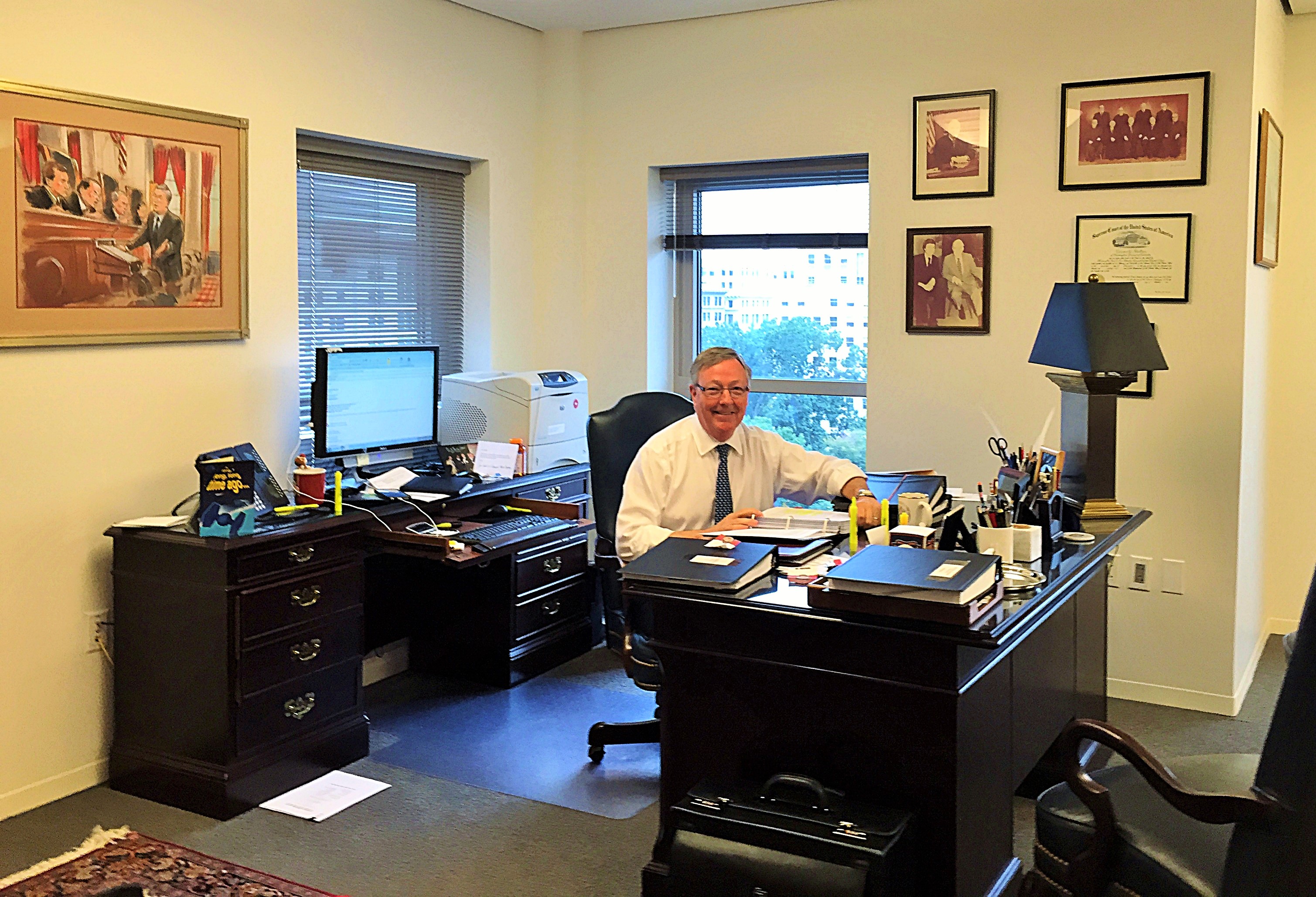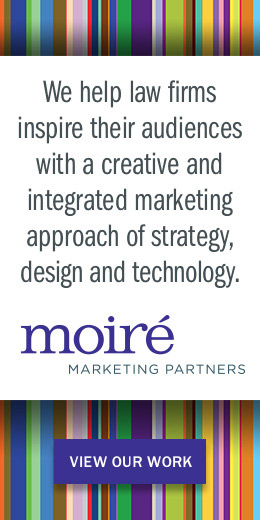It has been well documented that a relatively small group of elite lawyers have come to dominate the practice of arguing before the Supreme Court in recent years. And leading the pack is Carter Phillips of Sidley Austin, whose 83 arguments before the court are the most of any lawyer currently in private practice. Phillips, who serves as the chair of Sidley’s executive committee, recently spoke with the WILEF Tribune about the Supreme Court practice, the women who have influenced his career, and the diversity challenge facing law firms. (The interview has been edited for clarity and brevity.)
Very few women in private practice argued before the Supreme Court last term, a continuation of a long trend. Is there any reason to believe that will change any time soon?
The two ways to find yourself arguing before the Supreme Court are one, to clerk for a Supreme Court justice and two, to work in the Solicitor General’s office. Neither of these are necessary, but they’re both pretty helpful. Back in the Civil War, when I was there, there were five women who clerked for the court. Those numbers have improved some but only in the last few years are we anywhere near 50-50.
In the Solicitor General’s office, there are some years where the numbers of women are substantial, but we’ve had a number of years where the majority of people in the SG’s office were men. And the number of actual solicitors who were women, you could count on one finger and she’s not arguing before the court because she’s on the other end.
With three women Supreme Court justices, the number of women are going to increase over time; therefore you can expect that if you’re taking a snapshot 25 years from now, you’re going to see a more diverse situation than you do today.
Who are some of the active female Supreme Court advocates you admire?
Lisa Blatt of Arnold & Porter is extraordinarily talented and my own partner Virginia Seitz is as good an oral advocate as anyone that I’ve ever watched. Patricia Millett [now a judge on the U.S. Court of Appeals for the District of Columbia] was great until she decided that she looked better in black robes, I guess.
What career advice would give someone who wants to be the next Carter Phillips? Do you have to start plotting your career when you’re twelve years old?
First of all, I’m not sure why anyone would plot to be the next Carter Phillips, but I’ll put that issue aside. If you have it in the back of your mind that you would like to become an appellate lawyer, you almost certainly do well academically and then just follow it and see where it takes you. There are a lot of people who’ve gone to law school, done well, clerked, come to a law firm, thought that they wanted to be an appellate lawyer and then decided that they didn’t want to be. There’s a much bigger adrenaline rush involved with going to trial and going down that path. Even if you set out on the path to where I am, it’s pretty likely that something else will capture your fancy along the way.
What do you think the biggest misconception people have about being a Supreme Court advocate or being an elite appellate lawyer?
I think most people think of it as being a monastic experience. It’s not. Most people think about what they do as a first-year law student. They picture being in a cubbyhole in a library, thinking great thoughts and putting together a great brief.
The reality is, it’s much more of a people-oriented practice. Every case that I work on is already lawyered up to the nines. There are always at least three or four lawyers and much more often than not, there are fifteen lawyers involved in these cases.
It’s not like I come in and the seas part and I spew great wisdom and everyone bows their heads in silent homage It’s a process of persuasion and finding the best issues and how to best put them forward and articulate them. You have to do that with a consensus when you’re dealing with a team; that takes time and energy and is every bit as important as drafting the language in the first sentence.
The Supreme Court bar today is an exclusive and specialized club. Is it harder to break in now than it was 20 years ago? Will it get harder?
I think it’s tons easier to break in now than once upon a time. In the mid-1980’s, when I left the Justice Department, this practice didn’t exist. There was no clamoring for a Supreme Court bar. A case went up there and whoever was the lawyer below was the lawyer in the Supreme Court. Now, every law firm has come to terms that a Supreme Court and a high-end appellate practice is a viable component of big law firm practice, period.
The fact that there are a lot more entry-level opportunities also means that there’s going to be stiffer competition at the highest level. These things will be generational.
Do you remember what inspired you to become a lawyer in the first place?
My grandmother, actually. She used to tell me that I looked like her grandfather, and he was a prosecuting attorney so I should be a lawyer. I didn’t give it much thought but I didn’t have any other obvious choices of where I wanted to be employed. What sorely disappointed me was when my grandmother died and we were going through her effects, I actually came across a picture of her grandfather, and that man looks nothing like me. I was completely duped.
Well, it looks like it worked out okay. What woman has had the biggest impact on your career?
Without question, the woman who has had the greatest impact on my career is my wife. She and I met the first day in law school and we married before I graduated. I have seen her as a practicing lawyer, as a law professor, as a mother trying to balance all of these responsibilities. The pressures on her were, in my mind, 100 times greater than the pressures on me.
She proved that you can do it, but it’s not easy, and I never take for granted the difficult balances that every woman lawyer goes through. Just as an aside, in the only class that she and I took together, she cleaned my clock. She’s helped me in every aspect of the work that I do as a manager in the firm.
Do you rehearse arguments with her?
I talk them through with her. She has gone to 81 of my 83 oral arguments. She missed one the Monday after her dad died one weekend and she missed one when we had 22 inches of snow. Other than that, she’s been to all of my arguments. She has a remarkably keen sense to how the justices will decide a case.
I don’t usually try to bore her with the argument ahead of time. I just tell her what the case is about. I actually used to torment my children by telling them what the case was about in more detail to get their reaction on the theory that if I could articulate it well enough for a 9, 10, 11-year old, then I was probably ready to make a presentation to the court.
And other women who have had a major impact on your career?
I don’t think anyone could answer that question without mentioning their mother. She was a single mother for the first 11 years of my life and watching the sacrifices she made for me is something you can’t put out of mind. My daughter, because she helps to remind me that as much as things have gotten better for women, they’re certainly not perfect—it’s hard to be a practicing lawyer and a mother. And then there’s Virginia Seitz, who I mentioned before has been working with me and is someone who makes me a better lawyer every day. She’s just that good.
Shifting to your other day job as chair of Sidley’s executive committee. Sidley has obtained WILEF’s Gold Standard Certification every year, except for 2013. Do you recall when Sidley wasn’t certified?
Of course I do.
What did it mean to you and the firm?
It was emotionally bruising. My own image of Sidley is that we are inclusive and at the highest levels of our profession. These issues are difficult; if they weren’t difficult, you wouldn’t need organizations to help you attain certain objectives. When you fall short, it’s disappointing if nothing else and gives you new resolve to go off and find ways to correct the problem. It came as a bit of a surprise. It depends on your perspective, I suppose. You can’t become complacent. That was one of those years where they upped the ante and we were in a reactive mode and we didn’t react as quickly as I would have hoped because I just assumed we were in a position where we had always been.
The truth is, WILEF is at the top of the list of organizations totally devoted to this issue and is serious about it and listens to law firms. They don’t necessarily do what we ask of them but they at least listen to us and understand the problems that we face. They correctly ask more of us and make us do more than spout off our platitudes of how committed we are to empowering women in the legal profession by requiring us to actually demonstrate that we can accomplish precisely what we should be accomplishing.
The legal profession hasn’t been known for diversity but some progress has been made. Are you optimistic that it’s heading in the right direction?
I am optimistic that it’s heading in the right direction. I will give you two sources of concern that are always out there. One, I think there’s always a possibility of an economic downturn and I would hate to think that in that world, we would end up losing progress that we have made, but there’s a risk of that in our profession. I think each firm would have to reaffirm their commitment to not do that. That’s one aspect that I worry about.
The other one is the practice of law is much harder today than it was 30 years ago and I don’t think it’s going to get any easier. It’s very competitive; the quality of in-house legal departments requires law firms to be better and the more demands that are put on every lawyer makes activities outside of that sphere more and more difficult and complicated. I worry that women will be disproportionately affected by that trend. To me at least, what you have to do is, as a leader of a law firm, you have to recognize that these are real problems and real issues and acknowledge them and deal with them forthrightly and see that at the end of the process, we have, in fact moved in the right direction.
I don’t think there’s a law firm in the United States that would say they’re not sensitive to these issues and I think the vast majority of them mean it when they say it.



